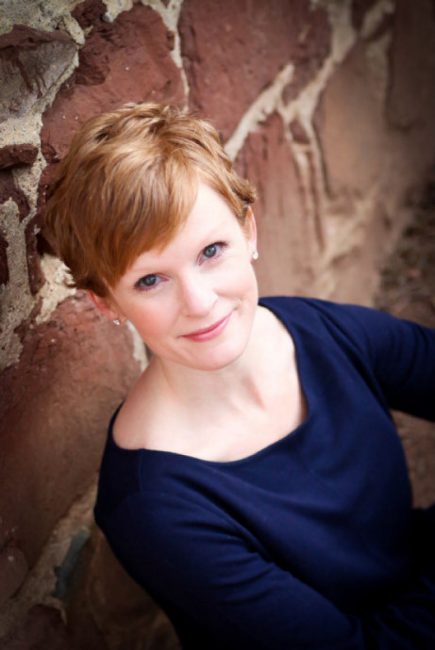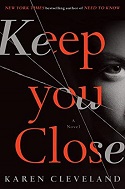 Synopsis:
Synopsis:
Idyllic neighborhood, perfect family, meaningful career. CIA analyst Beth Bradford has it all.
Until she doesn’t.
Facing an empty nest and a broken marriage, Beth is moving out of the cul-de-sac she and her family have long called home. Suddenly, the CIA removes her from the case she’s been working on for years: tracking an elusive Iranian intelligence agent known as The Neighbor.
Madeline Sterling buys and takes up residence in Beth’s old house. Now she has what used to be Beth’s: an adoring husband, three beautiful young children, and the close-knit group of neighbors in the cul-de-sac. She has it all.
But Beth — who can’t stop watching the woman who has stepped into her old life — thinks the new neighbor has something else, too: ties to Iranian intelligence.
Is Beth just jealous? Paranoid? Stressed out as a result of numerous simultaneous life changes?
Or is something more nefarious at play?
Most of the families on the cul-de-sac have some tie to the CIA. So they’re all keeping secrets. And they all know more about their neighbors than they should.
It would be the perfect place to insert a spy . . . unless one was there all along.
Review:

Author Karen Cleveland was raised in Florida and graduated from the University of Florida before earning master’s degrees from Trinity College Dublin, where she was a Fulbright Scholar, and Harvard University. She served as a CIA analyst, working on Russia before moving to the Counterterrorism Center. There, she focused primarily on Pakistan and Syria. She also drafted briefs for the President of the United States, as well as senior policymakers, and worked closely with an FBI Joint Terrorism Task Force. She was awarded more than a dozen Exceptional Performance Awards before leaving Washington, D.C. behind and relocating to North Carolina with her husband and three children. Her debut novel, Need to Know, was a bestseller and she followed it with Keep You Close, and You Can Run.
In The New Neighbor, Cleveland returns to familiar territory. Her protagonist, Beth Bradford, is a CIA analyst working counterintelligence in a division dedicated to Iranian intelligence services. The focus of her efforts is Quds Force, Iran’s external operations wing, and one of their high ranking commanders, Reza Karimi. The Agency has long believed Karimi is striving to gain undetected access to the Joint Worldwide Intelligence Communications System. If he succeeds, Quds Force will have “the keys to the kingdom” — full access via the intranet to top secret information. “There’s nothing more dangerous, from a national security perspective.” It is believed that Quds Force has already planted malware in locations external to the intelligence community — for example, in power plants — that just needs to be activated. It’s a project Beth has been working on for two decades and during that time, she has disrupted many attempts to breach security by ferreting out Karimi’s recruits.
But one recruit has evaded Beth for fifteen years. Known as The Neighbor, he or she is an access agent, recruited for the purpose of recruiting others, usually foreign intelligence service employees who prove to be valuable assets because they are difficult to detect since no one suspects them of wrongdoing. Most of them have security clearances and access to sensitive information they can pass on to their handler. Over the years, numerous conversations have been intercepted, suggesting that Karimi is moving incrementally closer to his goal.
As the story opens, Beth’s is navigating several simultaneous major life transitions. She and her husband, Mike, an attorney on track to become a partner in the law firm where he practices, have just sold their spacious home in the quiet cul-de-sac where they raised their three children and developed close ties to their neighbors. They no longer need such a large residence with both of their daughters, Aubrey and Caitlyn, finished with college. Aubrey is a teacher who has recently married. After graduating from Georgetown, Caitlyn has moved to London to work as a travel reporter. Beth and Mike take eighteen-year-old Tyler to the University of Virginia and get him settled into his dorm room, before returning home to spent their last night in the house. They have rented an apartment in which they will reside temporarily while looking for a smaller home. Or so Beth believes. Their marriage has been troubled for some time, but they have agreed that, as empty nesters, they will focus on repairing their relationship and she will have more time to devote to finally tracking down The Neighbor. Mike reveals, however, that he has other plans. He has already rented his own apartment and has no interest in saving the marriage. For the first time in twenty-five years, Beth will be completely on her own. She’s far from heartbroken, acknowledging in the first-person narrative through which Cleveland relates her story, “The truth is, I don’t want him. I just want the life we used to have.”
To make matters worse, Beth’s boss, Dale, informs her, “You’ve been selected for a position at the Kent School.” She’s not only been taken off The Neighbor case. She’s being involuntarily transferred to a teaching position and her access to the relevant database, Frozen Piranha, has already been revoked. Her protests are futile, and Dale will not share details about the latest intercept with her. She is no longer authorized to receive information about the case to which she has devoted nearly twenty years of her career. But she does see “The cul-de-sac” noted on the whiteboard in the room where the team brainstorms. Her coworker, Annemarie, won’t discuss her transfer or the case with her, warning her, “Let it go, Beth.” Beth is devastated and feels that her once-blissful life is suddenly unraveling.
Keep your friends close, and your enemies closer. Is that why she’s friends with me?
Returning to her house, one of several perfect homes in a quiet, serene cul-de-sac that has always felt welcoming and comforting, Beth instinctually senses that something is amiss. “Something seems off. I feel unsettled,” she observes. The sale of the house is consummated and the buyers, Madeline and Josh Sterling, who purchased it sight unseen, take up residence immediately. Beth becomes obsessed with Madeline, however. She is convinced that Madeline is not the person she claims to be — a kindergarten teacher turned stay-at-home mother to three young children. Her suspicions are fueled when she observes a large gun safe being moved into the house, spies a vase of red roses on a table in the living room (a signal used by Iranian intelligence agents since the red rose is the national flower of Iran), and hears Madeline speaking in Farsi. Madeline knows too much about her new neighbors and installs a security as soon as she moves in. Could Madeline be The Neighbor and the cul-de-sac referenced in the intercept the very street on which Beth lived for so many years?
Rather than accept the Agency’s decision to unassign her from the case, Beth employs reckless means to continuing gathering information. She spends a great deal of time surveilling her former home and its new owners, following them, and even resorts to lying to a colleague to obtain a report she is no longer authorized to review. The latest intercept? “The Neighbor has found a new cul-de-sac.”
To her former neighbors and friends, as well as her colleagues, Beth appears to be having an emotional breakdown that has caused her to become obsessed not only with the purchasers of her former home, but the other inhabitants of the cul-de-sac. But from Beth’s perspective, she is determined to uncover the truth about Madeline and ascertain the identity of The Neighbor before it is too late to stop Karimi from breaching protocols and harming the nation’s security interests. Although she recognizes that she is behaving in ways that appear erratic to others and taking chances that jeopardize her career, she explains that the potential benefits far outweigh the risks. Beth has never lost sight of the intercept that got her interested in the case so many years ago: “Remind The Neighbor to use the children.” She recalls. “Using children to accomplish goals — that was a bridge too far,” It was the impetus for her commitment to the mission to stop Karimi and Beth will not be dissuaded, even when she finds herself in danger.
Cleveland has once again crafted a tensely gripping thriller that proceeds at a consistently rapid pace. Beth is an unreliable narrator, and Cleveland deftly heightens the suspense by causing readers to question whether she is correct when she insists that “the ends justify the means. Everyone lies.” Caitlyn reminds her that she advised her children to “be bold.” Are her colleagues correct to be concerned about her emotional well-being or is she being subjected to workplace misogyny, marginalized and stripped of her responsibilities because of a stereotypical, arcane notion that a “hysterical” woman is inappropriately acting out? Beth remembers happier days when her children were young, describing how she was introduced to the neighbors who became her best friends, especially Alice, the federal judge who lives next door, and fondly recalling all the evenings spent sitting in lawn chairs in the cul-de-sac drinking wine, gossiping, and watching the children play. She also is reminded of specific conversations that did not seem particularly significant at the time but, in hindsight, contained clues to who might be the recruiter. As her rogue investigation proceeds, Beth suspects nearly all of her neighbors at various junctures, most of whom also work at the CIA. In light of the evidence she uncovers, she questions whether any of her neighbors were ever true friends or if, rather, they befriended her only to further an agenda. She suffers horrible betrayals, and employs unconventional and unethical means to attempt to elicit confessions as she inches closer to learning the identity of The Neighbor.
Cleveland’s clever story is contemporary and timely. In addition to illustrating the sexism to which Beth is subjected, Cleveland injects the well-publicized vulnerabilities of both governmental and corporate data storage systems and the U.S. power grid, and the ongoing student loan crisis also figures into the story. The evidence Beth discovers is nothing less than terrifying and, based upon Cleveland’s background, believable. She credibly demonstrates the ingeniously diabolical lengths to which America’s enemies will go in order to accomplish their goals.
Ultimately, Cleveland convincingly affirms that U.S. interests depend upon security professionals living up to the oath they swear to defend the country against all enemies, foreign and domestic, especially traitors lurking among their ranks. And that it is not possible to ever really know or wise to blindly one’s neighbors, no matter how beautiful and idyllic your cul-de-sac may seem.
Excerpt from The New Neighbor
One
Three Weeks Earlier
“Perfect,” I say, eyeing Tyler through the viewfinder of my Nikon, pressing down gently on the shutter release. I lower the camera, check the image captured on the screen. Tyler’s smiling broadly, bathed in early morning sunlight, leaning on the handle of his rolling suitcase, the freshly painted front door behind him, the stone planters on either side bursting with late summer color. It’s true, it’s the perfect shot, Instagram-worthy, if I were into that sort of thing. The last picture I’ll snap of one of my kids in front of the home where we raised them.
But it shouldn’t be the last, should it? Perfect as it is, it’s all wrong.
Tyler’s already walking past me, heading toward the driveway, suitcase in tow.
“One more,” I say.
He turns. “Really, Mom?”
“Right there, with the cul-de-sac behind you.”
He smiles again for the camera, this time with a touch of exasperation, and I get the shot. I lower the camera and check the screen. Better. There’s the for sale sign in the yard, under contract tacked to the top. But I can Photoshop that out.
“It’s just an empty street,” Tyler says, looking out at the loop.
I follow his gaze. The Kanes’ and the Johnsons’ and the O’Malleys’. Softly lit houses, lush lawns, mature landscaping. Everything quiet, everything perfect. And he’s right—the street is empty.
“Well, now it is,” I say.
He continues on down the path to the driveway, suitcase wheels clacking over the breaks in the concrete. In the driveway, Mike’s starting the car, the engine sputtering softly. Everyone’s ready but me.
I’m still staring at the loop of pavement, and in my mind’s eye it becomes full again. Figures appear, almost ghostly at first, but gradually coming into focus. Children on bikes, some still with training wheels; others drawing with sidewalk chalk; the younger ones toddling around, unsteady on their feet. Their mothers, sitting in lawn chairs arrayed in a half circle, chatting and laughing—
“Mom!” comes Tyler’s voice from the driveway, and the figures vanish. The cul-de-sac is empty once again.
“Coming.” I start walking toward the driveway, and can’t help but steal one last glance at the street. That scene was so clear in my mind I would have sworn it was real.
It’s a two-and-a-half-hour drive to the University of Virginia, another half hour to wait for a parking space to open up. When it finally does, the three of us make our way to Tyler’s dorm, an old brick building near the center of campus, past a courtyard with big shade trees.
The room itself is small, a typical dorm room, with two of everything: extra-long twin beds, desks, dressers, all the furniture solid and well worn. We’re the first to arrive.
I start unpacking while Mike and Tyler head down to the car for more boxes. Place stacks of clothes into the dresser drawers. Books and school supplies on the desk. I’m placing a couple of pairs of shoes into one of the small closets when they walk back in, maneuvering the TV box through the door.
“I don’t need you to unpack,” Tyler says to me as they set down the box on the carpeted floor, leaning it against the dresser.
“I want to.”
The door opens before he can object, drawing our attention.
A skinny teenage boy with a smattering of acne stands in the doorway. Must be the new roommate. He and Tyler have chatted online, followed each other’s social media accounts, but they haven’t met in person yet. “Hey,” the boy says, lifting a hand awkwardly.
“Sweetheart, can you walk all the way through the door, please?” comes a terse voice behind him. He steps forward into the room, and a woman follows, giant-sized Target shopping bags in each hand. Two blond grade-school-age girls trail behind her, sullen looks on their faces, bickering. She shakes her head at me. “Kids.” She rolls her eyes, then adds, “Hi. I’m Beth.”
“Well, that’ll be easy to remember,” I say. “I’m Beth, too.”
“No way.”
She must be the mother, but she’s young. Mid to late thirties, maybe. Tight-fitting workout clothes, hair that looks freshly styled, flawless makeup, not that she needs it. I’m instantly conscious of my own appearance. Loose-fitting clothes, air-dried hair, ChapStick. And my age. I have a decade on her, at least.
We might have the name in common, but the similarities end there.
“Where are y’all from?” she asks.
“Near DC. McLean.” I watch for any spark of recognition. In the DC area, McLean is synonymous with Langley, which inevitably leads to questions about the CIA. Fortunately, though, her expression remains blank, and I don’t need to be evasive about my career. “What about you?”
“Richmond.”
One of the girls elbows the other, who instantly shouts, “Mom!”
“Girls, cut it out,” she says curtly. Then, to me, “I should have brought their iPads.”
The room, already small, now feels almost claustrophobic. The two boys are helping Mike pull the TV out of the box; there’s barely room for the three of them between the two beds.
“It’s a madhouse out there,” she says to me, moving the shopping bags to the unclaimed side of the room.
“Sure is.”
“Would have left earlier if I’d known.” She shakes her head. “Rookie mistake.”
I smile. She reaches into one of the shopping bags, pulls out an unopened set of sheets, then a new pack of smart plugs, the same kind the kids talked us into getting at home. Everything’s controlled with a voice now, or an app.
“Is this your first time, too?” she asks. “Sending someone off to college?”
“Actually, third. Our girls are already out of college.”
“Yeah?” she says, pulling out a plastic-wrapped pillow, then reaching back into the bag. It looks like she raided the back-to-school section of the store. “What are they doing now?”
“My oldest is a teacher. She just got married in June.”
“No way.” She pauses and looks at me, a boxed Bluetooth speaker in her hands. “Gosh, you might have grandchildren soon.”
The words are cringeworthy. I’m not old enough for that. And Aubrey’s too young to be married, let alone have kids. I mean, she’s the age I was when I had her, but still. “Well, they want to get a house first. Settle down. But they’re looking for one, so it might not be long. . . .” I realize I’m rambling. “And my younger daughter just graduated from Georgetown in May. Took a job as a travel reporter. She moved to London last month.”
“How exciting. What a summer for your family.”
What a summer, indeed. “And your girls? How old are they?”
“Ten and eight. We’re still in the gymnastics and soccer stage of life.”
The girls are sitting on the bare mattress of one of the twin-sized beds, still looking petulant. The older one says something quietly to the younger one, who immediately says, “No I didn’t!”
“Girls,” she scolds, turning toward them. “I said enough.”
She turns back to me. “So you’re going home to a quiet house.” She gives a wry laugh. “Lucky you.”
I force a smile.
It’s really hot in here. Mike and the two boys have the TV out of the box now, packing material strewn about. She’s opening up the second shopping bag.
I check my watch. Ten minutes until eleven. “Well, I think Tyler’s things are mostly unpacked, so I’ll get out of here, give you all some space to move around.”
“Tight quarters in here, huh?”
“No kidding. It was really nice to meet you.”
“Likewise,” she says with a smile.
I turn toward Mike. “I’m going to wait outside. Come get me when you and Tyler are ready for lunch, okay?”
“Sure.”
Tyler’s focused on unwrapping cables and cords, doesn’t even look up. I watch him for a moment, then turn and let myself out of the room.
I sit on an empty bench under a large shade tree, just outside the entrance to the dorm. The air is fresh and pleasantly cool, and the leaves are rustling softly. I pull my phone from my purse, open up the HomeWatch app. A live feed appears. It’s from the default camera, the one mounted above our front door, looking down at the porch, and the street beyond. Street’s empty, porch is empty. Everything’s quiet.
I set down the phone on the bench beside me and watch the passersby. Anxious teenagers, parents loaded down with boxes and suitcases and shopping bags. New beginnings for some, chapters closing for others. Bittersweet.






1 Comment
This sounds very intriguing.